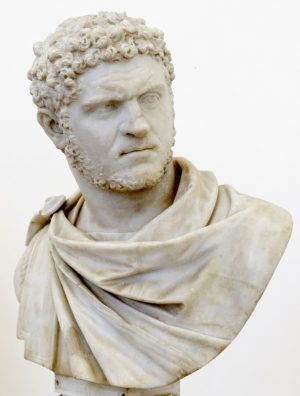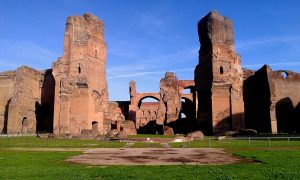Seen as one of the most blood-thirsty emperors to ever rule Rome, Caracalla’s accomplishments are dimmed by his brutality and crudeness. He honored the people not only by building a colossal public bath but more importantly, he gave them universal Roman citizenship and, in the process, reinvented the concept of modern statehood for Europe to take up centuries later.
Early Life
Caracalla was born in 188 in Lugdunum, in modern-day France, the son of Septimius Severus and Julia Domna and the brother of Geta. His original name was Lucius Septimius Bassianus, but when Caracalla was seven years old, Severus changed his name to Marcus Aurelius Antoninus to create an association with the prestigious Antonine dynasty. He became commonly known as Caracalla because he liked to wear a hooded tunic called caracalla that was popular in Gaul.
Caracalla and his brother, Geta, who was one year younger than him, shared an intense hatred for each other, and their quarrels dragged on for years. They would fight constantly, and their mother often had to come in between them to keep them from hurting each other. At the age of fourteen, Caracalla married Fulvia Plautilla, the daughter of the prefect of the Praetorian Guard, Fulvius Plautianus. It is believed that Caracalla hated both Fulvia and her father, although the reason for this is not clear. Caracalla eventually accused Plautianus of plotting to kill him and his father, Severus, and had him executed in 205. Fulvia was exiled to Sicily and later to Lipari, and was eventually strangled to death, most probably on Caracalla’s instructions.
Reign as Emperor
The tensions between Caracalla and his brother intensified even more when the younger Geta was also appointed emperor in 209. The brothers were now primed to be co-rulers, and this imminent sharing of power only enraged the fires of the rivalry. When Severus died in 211 during a military expedition in Caledonia, the brothers became joint emperors, and this signaled the beginning of the end of their conflict. Both men lived in continual fear, each one constantly suspicious of being poisoned by the other. The tension drove the two emperors to talk of splitting the empire, with Geta to take the east, and Caracalla to stay in Rome. However, Julia stopped this plan from happening, dreading she would not be able to keep an eye on her sons if the split were to push through. During the Saturnalia in 2011, Caracalla attempted to assassinate Geta but failed, prompting the younger brother to increase the number of his bodyguards.
The following week, Caracalla pretended to seek peace with Geta and arranged for a meeting at their mother’s house. Geta failed to decipher the trap and went over to Julia’s house unarmed and without his bodyguards. Upon entering Julia’s house, centurions attacked him and stabbed him repeatedly. The young emperor collapsed and died in his mother’s arms. Caracalla was now the one and only emperor of Rome. He immediately ordered Geta’s image to be removed from paintings, coins, and inscriptions; and had all of his brother’s friends killed.
Accomplishments
The second-largest baths ever built in Rome were initially planned by Severus, but it was his son, Caracalla, who built them. Called the Baths of Caracalla, their construction began in 211 and was opened to the public in 216. Sources say they were operational until around 530. The Roman historian and poet, Olympiodorus of Thebes, estimated that the baths could accommodate 1,600 visitors at a time, with their daily capacity estimated to be around 8,000 visitors.
Another one of Caracalla’s reforms was the increase in the salary of soldiers from 2,000 to 3,000 sesterces. This reform clearly won him the approval and support of the military at a time when the military could cut down an emperor at any time. This prudent move was based on the advice of his father, Severus, who told him to pay the soldiers well and not think of anyone else.
Caracalla’s most famous reform, however, was the Constitutio Antoniniana, which was issued in 212 and granted citizenship to everyone in the empire, except slaves. This seems like a benevolent move on the part of Caracalla, but the Roman historian and politician, Cassius Dio, states that Caracalla’s motive in passing this law was to increase tax collection. With the salary increase granted to soldiers, the possibility of raising more money to be handed out to the army can not be ruled out. This thought seems to be outweighed, however, by suggestions that Napoleon framed the French Civil Code after the Constitutio Antoniniana.
Death
While preparing for a military campaign in Parthia in 217, Caracalla dismounted his horse to urinate, and it was at this moment that a soldier named Justin Martialis stabbed him to death. Martialis was ordered by a Praetorian Prefect named Macrinus, who had heard of a prophecy stating he would kill Caracalla and replace him on the throne. Fearing that Caracalla might react to the prophecy before he could, he arranged the assassination. As the new Emperor of Rome, Macrinus ordered the removal of Caracalla’s statues from public places. He did not, however, declare a damnatio memoriae against Caracalla, as the military was still loyal to the slain emperor.

